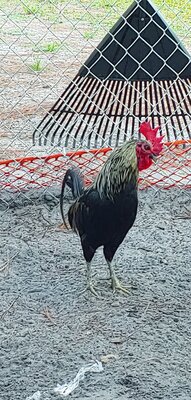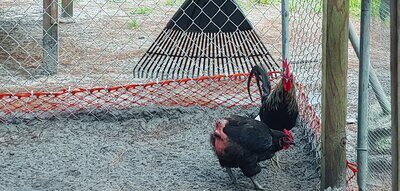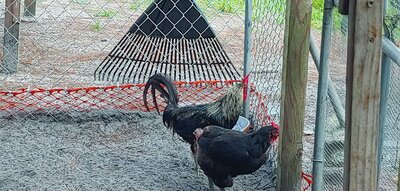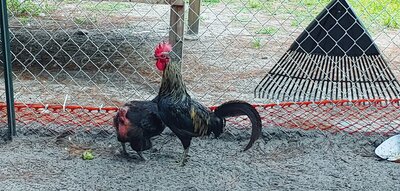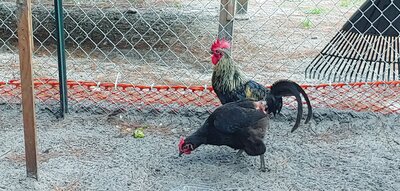Navigation
Install the app
How to install the app on iOS
Follow along with the video below to see how to install our site as a web app on your home screen.
Note: This feature may not be available in some browsers.
More options
You are using an out of date browser. It may not display this or other websites correctly.
You should upgrade or use an alternative browser.
You should upgrade or use an alternative browser.
Breed?
- Thread starter Merylyn
- Start date
TheOddOneOut
🌧️🌧️🌧️
Can we have better side-view pics?What breed is this rooster?
Profile please - he may be an attractive cross bred.
Looks slightly Isbar/Silverudd. 


- Thread starter
- #5
Ye
Wow thanks!
- Thread starter
- #6
This hen needs some major help to recover from that seriously angry skin.. have you searched them or treated for parasites yet? That doesn't LOOK like over mating. Did they suffer a predator attack, prior bullying or anything like that?

Adding your general location to your profile can help folks make their best suggestions possible at a glance.. like what treatments may be available etc.
Is she laying any eggs? Do you know their age at all? How long have you had them?
Adding your general location to your profile can help folks make their best suggestions possible at a glance.. like what treatments may be available etc.
Is she laying any eggs? Do you know their age at all? How long have you had them?
- Thread starter
- #8
I got them recently for free he had to add the rooster to stop the hens from fighting each other not all of them are like this and some are growing like spikes with tufts of feathers coming out and some fluff however some havent changed at all any advice on what i should do?This hen needs some major help to recover from that seriously angry skin.. have you searched them or treated for parasites yet? That doesn't LOOK like over mating. Did they suffer a predator attack, prior bullying or anything like that?
View attachment 2292739
Adding your general location to your profile can help folks make their best suggestions possible at a glance.. like what treatments may be available etc.
Is she laying any eggs? Do you know their age at all? How long have you had them?
- Thread starter
- #9
Only 3 to 6 out of 22 hens lay eggsI got them recently for free he had to add the rooster to stop the hens from fighting each other not all of them are like this and some are growing like spikes with tufts of feathers coming out and some fluff however some havent changed at all any advice on what i should do?
If you are in the US.. use a "flock raiser" (20% protein) or "grower" (18% protein) feed and put oyster shell on the side for the active layers. This will improve the birds overall condition and help them recover more quickly if they are currently getting layer. The difference in my flock's molting routine since making the switch has been very convincing.. They molt softer, return to lay sooner, and don't withdrawal like before.some are growing like spikes with tufts of feathers coming out and some fluff however some havent changed at all any advice on what i should do?
Layer feed is too high in calcium for non layers which if fed LONG TERM *could* (doesn't mean will) cause kidney issues including gout, possible failure and even sudden death.. often mistakenly blamed on heart attack. It is also lower in protein but importantly amino acids.. which feathers are made from 90% protein and it's amino acids.
Regarding parasites.. Check after dark using a flashlight below the vent and on the abdomen and look for crawlies running away as this is the easiest time to see them.
That girl MIGHT be having some ascites (water belly) going on or it may just be from parasites coupled with bullying. I have had LARGE groups of hens and never an issue as described.. Different set ups, feed, space, and environments make a huge difference in flock antics.. So the previous person MUST have set them up for failure.. even if only by accident.
So far the best results I've had against poultry parasites is using a permethryn based product.. found in the equine section at feed stores and labeled "horse fly spray", under many name brands and concentrations from ready to use or measure to dilute. I like the ready to use for the convenience and a 32 oz bottle costed under $8 and treated (for mosquitoes) my 2 large goats and 3 medium dogs... plus for mite or lice my flock of 72 birds and lasted me 2+ years when using as needed including spritzing roost, lay boxes, coop floor, etc.
If you do follow this route.. it only takes a very small spritz,, just below the vent, under each wing pit, and to the nape of neck on the back of the head.. with feathers parted so the spritz hits the skin. Soaking is NOT required and it's labeled for use in chickens with NO withdrawal time on eggs. Repeat in 7-10 days according to directions if your able to identify your parasite culprit. This is key to disrupting the life cycle and not having resistance built to the product. Please note that each bird has it's own immune system and as such some may be experiencing more challenge than others.. but ALL should be treated so they don't become parasite targets.
Doing treatments like this.. is easiest done after dark using a flashlight (or headlamp is best) and keeping it dim to prevent any chasing and confusion.
Some of those birds may be molting. Some broken or missing feathers may not come back in until they do molt. But I bet you do see start to see a difference before long in over all condition.
If you are able.. you might consider doing a group sample fecal float at the vet or mail in.. to check for internal parasites as the only ones that may ever be seen in dropping are large round worms and tape worms. All others stay inside the intestines and only the microscopic oocysts (eggs) will pass in dropping to never be seen by the naked eye. I never just treat without confirmation of need to make sure I use the right medication as not all effect every parasite. Otherwise I MIGHT consider treating with broad spectrum wormer TWICE (according to directions), since they are new birds to your land with obvious prior management issues.
You've come to the right place for support. CANNOT wait to see the difference now that they're under your care. Be patient, they will return to lay and pay you back!

New posts New threads Active threads
-
Latest threads
-
-
-
Chicken with tail down, eyes half closed
- Started by NightFury06
- Replies: 0
-
-
-
-
Threads with more replies in the last 15 days
-
-
-
-
-
Please Help! Eggbound & Possible Prolapsed Vent
- Started by Elspeth Dinsmore
- Replies: 102
-

